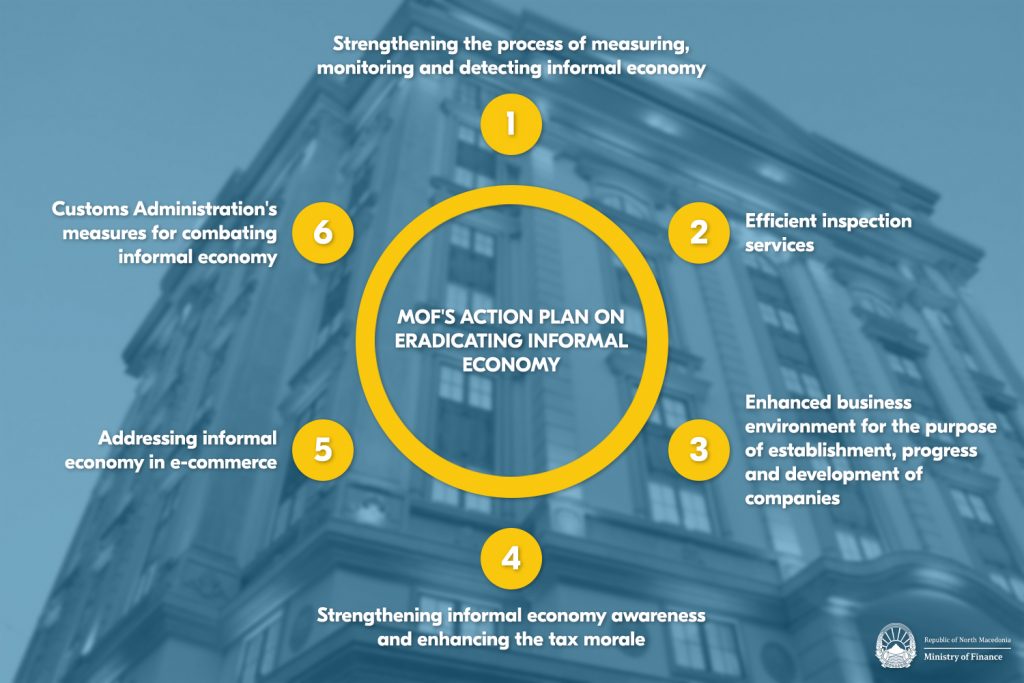16th April 2021, Skopje – Improved business climate and sustainable economic growth require constant undertaking of actions for an ecosystem with zero tolerance and fair (loyal) competitiveness, with everyone paying their share of taxes and duties. In view of this, MoF’s Action Plan on Eradication of Informal Economy encompasses 16 measures and the “Action 21” Plan on Corruption Eradication incorporates 18 measures, which measures the Minister of Finance, Fatmir Besimi, and the Deputy Prime Minister of the Government in charge of fight against corruption, crime, sustainable development and human resources, Ljupcho Nikolovski, discussed with the business sector representatives.

In addition to the Ministers, Director of the Public Revenue Office, Director General of the Customs Administration, Directors of the Financial Intelligence Office, the Financial Police and the State Foreign Exchange Inspectorate took part in the discussion, while the business community attendees were representatives from the Chamber of Commerce, the Macedonian Chambers of Commerce, the Chamber of Commerce of North-West Macedonia, the Foreign Investments Council, the Association of Foreign Companies with Technologically Advanced Production, the German Industry and Commerce, the AmCham, MASIT, MATTO and the Macedonian E-Commerce Association.
Minister of Finance, Fatmir Besimi, pointed out that informal economy undermines the competitiveness of both the companies and the individuals and it gives an unfair and illegal “advantage” for those not meeting the legal requirements. The Minister went on by saying that informal economy deteriorates the integrity of our entire tax system, with adverse effects on the Budget and revenue collection, thus curtailing the funds intended for investments in better and quality health, education and services rendered to the citizens.
Besimi underlined that the objective of MoF’s Action Plan on Eradication of Informal Economy is to strengthen the informal economy eradication mechanisms through outlined measures and activities. He pointed out that the Plan incorporates 6 priorities: 1) strengthening the process of measuring, monitoring and detecting informal economy; 2) efficient inspection services; 3) enhanced business environment for the purpose of establishment, progress and development of companies; 4) strengthening informal economy awareness and enhancing the tax morale; 5) addressing informal economy in e-commerce and 6) Customs Administration’s measures for combating informal economy. Implementation of the measures and the activities in view of these priorities is expected to contribute to reduction of informal economy in the medium term by around 5 percentage points, which is now estimated at about 37% of GDP according to the IMF indicators.
“Adoption of this Action Plan is a result of the Government’s commitment to reducing the informal economy, taking into account that there is no country in which informal economy, as a phenomenon, does not exist. It is government’s responsibility to strengthen the legal and the economic environment in which legal operations is the easiest and the most profitable way for business development, guided by the principles of equality, objectivity and transparency, by setting up clear regulations and rules simple to follow and adhere to, as well as by imposing sanctions for those not applying them and not complying with them”, Besimi pointed out.

Deputy Prime Minister Nikolovski underlined that he and his team work actively on monitoring the economic processes and enhancing the economic flows, by creating adequate measures helping the ongoing fight against corruption and crime. These measures significantly contribute to strengthening the business sector and its business relations, thus creating conditions for uninterrupted functioning of the companies. To that end, interventions are envisaged in the area of public procurement, as well as establishment of a single point for issuance of licenses to particular companies.
Nikolovski said that systemic solutions included in the Plan on Corruption Eradication contribute significantly to creating a favourable business climate, offer safety and open possibilities for development of the economy in North Macedonia.
“Corruption, as a socially adverse phenomenon, causes undesirable consequences that disrupt both the good business management and the corporate governance. It is of exceptional importance to provide conditions through systemic solutions and laws to contribute to business progress, opening of new businesses, boosted trade and export, as well as job creation for the young generations in which hands lies our future”, Nikolovski underlined.
The business community pointed out that acting to the end of solving these two pressing issues, i.e. informal economy and corruption, is indispensable for building a sound economic system to add value and generate economic growth.

















